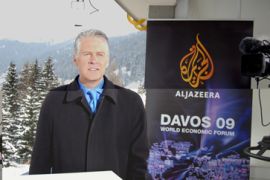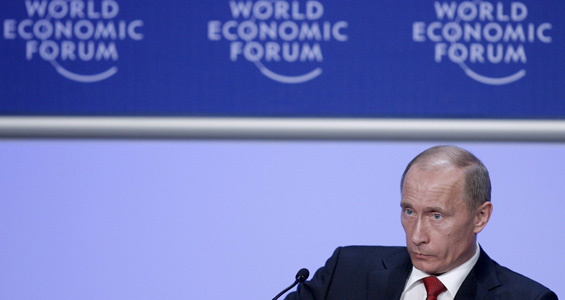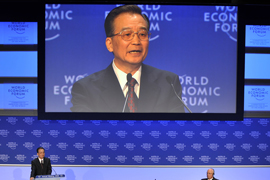Reporter’s diary: New era in Davos?
Al Jazeera’s Stephen Cole reports from the World Economic Forum.

 |
| Vladimir Putin, the Russian prime minister, warned of state intervention in the private sector [EPA] |
It is the second day of the World Economic Forum at Davos and the big players have shown their hands.
Wen Jiabao, the Chinese Premier, was first to address the forum. Almost discarded from his diplomatic-speak about the economy was that China expected social unrest as a result of the global financial crisis.
| In depth | ||||||||

Focus
Videos
|
China is one of the most difficult countries to report from because the police don’t like foreigners seeing the truth behind the implacable face. The Chinese Premier is on what could be termed a goodwill tour of Europe.
Keep reading
list of 4 itemsEcuador weighs security, international arbitration in latest referendum
‘Triple spending’: Zimbabweans bear cost of changing to new ZiG currency
Boeing hit with 32 whistleblower claims, as dead worker’s case reviewed
“Let us strengthen confidence and work together to bring about a new round of global economic growth,” he told the forum’s audience.
Wen said that China’s economy has been in recovery since December with domestic consumption rising by 21 per cent at the start of the Lunar New Year as compared to the same period last year.
Wen admitted that the global financial crisis had a “rather big impact” on China’s economy.
“We are facing severe challenges, including notably shrinking external demand, overcapacity in some sectors, difficult business conditions for enterprises, rising unemployment in urban areas and great downward pressure on economic growth,” he said.
However, he expressed confidence that with hard work, China should be able to meet its 2009 target of eight per cent growth. The Chinese economy grew by nine per cent last year.
Blaming the bankers
I interviewed at least eight people about the state of the global economy and so far most blame has been directed at bankers.
There has also been blame pointed at America and its mortgage and housing crisis.
Tom Donohue, the president and CEO of the American Chamber of Commerce, rejected such accusations.
When I asked him if America was responsible he replied saying such an idea was “a joke”.
I bit my lip and said “but no-one is laughing not least the millions of Americans who have lost their jobs and homes”.
For me though the guest of the day was John Hope Bryant, a presidential advisor to Bill Clinton, and George Bush, the former US presidents, and now Barack Obama. He chairs Operation Hope, a charity organisation which addresses homelessness and poverty.
“In the old days you didn’t have a vote because you were a slave; today 40 million Americans don’t have a bank account,” he said.
“It’s not a black or white issue; it’s a poor issue. [Hurricane] Katrina wasn’t a tragedy for black people it was a tragedy for poor people,” he added.
Putin promise
 |
| Like Putin, Wen urged the global community to work together to find solutions [AFP] |
Vladimir Putin, the prime minister of the Russian Federation, followed Wen in urging that the US, Europe and other countries work with his country to resolve the global financial crisis.
“We cannot afford to be isolationist and egotistic,” he said. He promised not to resort to protectionism or erect trade barriers that will simply worsen the global financial crisis.
Putin warned against state interference in the private sector, even as governments continued to pump billions of dollars into financial institutions and other companies in efforts to keep them afloat and save the jobs they provide.
He added that this error was made by the former Soviet Union with disastrous results and the Russian Federation will not make the same mistakes. However, Moscow has set aside $50 billion to help its crisis-affected companies.
The prime minister also called for international action to promote global energy security, pointing out that the extreme volatility of energy prices benefits no one.
New pipelines
Putin said Russia will do its part by building new gas pipelines across the North and Baltic Seas, thus avoiding problems with gas supply, an apparent reference to Moscow’s recent face-off with Ukraine over pipelines that pass through its territory.
The World Economic Forum is ready to help, said Klaus Schwab, the founder and executive chairman, World Economic Forum.
“What we are experiencing is the birth of a new era, a wake-up call to overhaul our institutions, our systems and, above all, our thinking and our actions, and to adjust our attitudes and values to the needs of a world which rightly requires a much greater degree of responsibility and accountability,” he said.
After hearing both China and Russia blame debt-fuelled consumption for massive financial collapse, business leaders and policymakers will now turn their attention to financial regulation, energy, trade and global security.
Some have predicted that the emerging economies will pull the world out of recession.
Al Jazeera will be focusing on the global emerging economies today and amongst other guests I will be talking to World Bank officials and asking why they did not predict the financial crisis.
